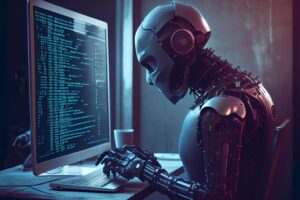- In an era of advancing artificial intelligence, certain careers remain resilient to automation.
- Professions like artists, therapists, medical professionals among others, are challenging for AI to replace due to their reliance on human creativity, empathy, expertise, and complex interpersonal interactions.
- While AI can augment these professions by automating routine tasks and providing data-driven insights, the distinctive human qualities within these careers make them less susceptible to AI takeover.
Follow us on Facebook and Twitter for the latest entertainment news and exclusives
As artificial intelligence (AI) continues its rapid advancement and integration into our society, it’s increasingly important for individuals, particularly Kenyans, to recognize that certain occupations are less susceptible to automation. These roles heavily depend on distinct human qualities and expertise. Professions that emphasize human interaction and cultural comprehension, such as healthcare, education, social work, and the arts, are deeply rooted in qualities like empathy and compassion, which are often best fulfilled by human intelligence rather than AI.

This recognition serves a dual purpose by fostering economic resilience in Kenya’s multifaceted economy, guiding individuals toward careers less vulnerable to automation, and enhancing education and training strategies to equip Kenyan youth with skills resistant to automation.
Furthermore, it advocates for a balanced approach to AI’s impact, emphasizing the augmentation of human abilities rather than replacement. This understanding empowers Kenyan audiences to navigate the evolving workforce while preserving the unique qualities that define their professions as distinctly human.
Here is a list of ten professions that are particularly resistant to being replaced by AI shortly.
Artists and Performers
The creative arts, including music, art, and performance, thrive on the depth of human emotion and creativity. AI may generate content, but it lacks the emotional depth and artistic expression that only humans can provide. Additionally, creative leisure activities like theatre, dance, and live music require a human touch for true appreciation.
Therapists and Counselors
These professionals offer empathy, emotional support, and understanding that AI struggles to replicate. Building trust and rapport with clients is a crucial part of the therapeutic process, and AI cannot adapt to individual needs or interpret non-verbal cues like body language.
Medical Professionals
While AI can aid in diagnosing conditions, doctors, surgeons, and nurses possess irreplaceable knowledge, experience, and intuition, especially in complex medical situations. Beyond medical expertise, they offer essential empathetic care, support, and reassurance to patients and their families.
Social Workers and Community Workers
Professions focused on social work and community outreach demand cultural understanding, emotional intelligence, and the ability to build relationships and trust, qualities that AI currently lacks.
Carers
Caregivers provide not only physical assistance but also emotional support and companionship, particularly crucial for individuals with limited verbal communication abilities. AI cannot offer the same level of empathetic reassurance.
Teachers
Human teachers facilitate personalized learning experiences and mentoring, aspects that AI systems are yet to fully match.
Entrepreneurs
Identifying market gaps, generating original ideas, and making ethical business decisions are areas where human creativity and judgment are invaluable. AI still struggles to navigate complex ethical situations effectively.
Managers
Effective management requires charisma, strategic thinking, and motivation skills that AI lacks. While AI can provide data-driven insights, human managers are essential for navigating intricate business dynamics.
Skilled Tradespeople
Carpentry, plumbing, and electrical work necessitate physical dexterity, problem-solving, and adaptability to unique situations, making them challenging for AI to replace shortly.
Lawyers and Judges
Legal professionals must possess in-depth knowledge of laws, regulations, and precedents, coupled with critical thinking skills. Constructing arguments and representing clients in court involves complex decision-making beyond AI’s current capabilities.
In the words of a VentureSmarter spokesperson, “AI is unlikely to entirely replace these professions, as they involve intricate human interactions, creativity, empathy, or specialized manual skills that current AI technologies cannot replicate. Nevertheless, AI can enhance these professions by automating mundane tasks and offering data-driven insights.”
These insights should guide Kenyan audiences to make informed career choices in a rapidly evolving technological landscape, ensuring they embrace AI as an augmentation rather than a replacement for human expertise and compassion.
Follow us on Facebook and Twitter for the latest entertainment news and exclusives




























